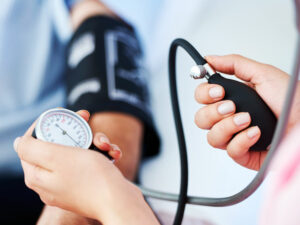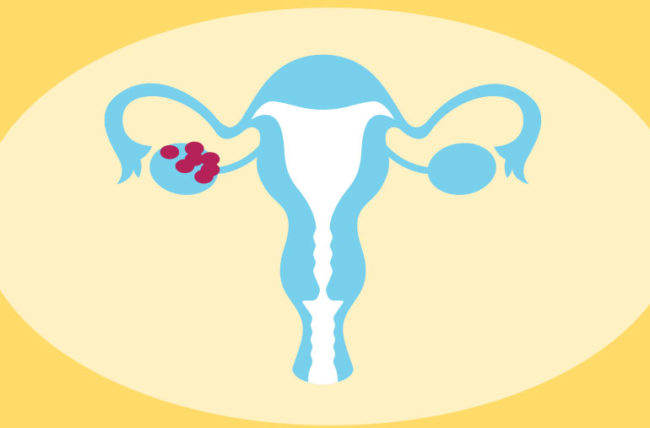Do you know what insulin resistance is? If you have PCOS, you are at risk of developing this condition. Insulin resistance can lead to diabetes, so it’s important to understand the symptoms and how to lower your risk. In this blog post, we will discuss what insulin resistance is, the symptoms of PCOS that indicate a higher risk for developing diabetes, and ways to prevent insulin resistance from happening.
Contents
What Is Insulin Resistance?
 Insulin resistance is a condition where the body’s cells do not respond properly to insulin. Insulin is a hormone that helps the body’s cells use glucose for energy. When cells are resistant to insulin, they do not absorb glucose as well which can lead to high blood sugar levels.
Insulin resistance is a condition where the body’s cells do not respond properly to insulin. Insulin is a hormone that helps the body’s cells use glucose for energy. When cells are resistant to insulin, they do not absorb glucose as well which can lead to high blood sugar levels.
There are many factors that can contribute to insulin resistance, but the most common cause is excess weight. Fat cells produce hormones that can interfere with how insulin works. PCOS is also a contributing factor to insulin resistance. Women with PCOS have high levels of androgens, which are hormones that can make it difficult for the body to use insulin properly.
Now that we have a better understanding of what insulin resistance is, let’s discuss how it can be a risk factor for diabetes.
Symptoms Of Insulin Resistance In PCOS
There are several symptoms of PCOS that can indicate a higher risk for developing insulin resistance and diabetes. These symptoms include:
Weight gain
Weight gain is one of the symptoms of PCOS that can indicate a higher risk of developing diabetes. Women with PCOS are more likely to be overweight or obese, which is a major risk factor for insulin resistance. When you are overweight, your body has to produce more insulin to control your blood sugar levels. This can eventually lead to insulin resistance.
High blood sugar levels
If you have PCOS and you notice that your blood sugar levels are higher than normal, this could be a sign of insulin resistance. High blood sugar levels can damage the body’s cells and lead to diabetes. Insulin resistance can also cause the body to produce more insulin, which can lead to high blood sugar levels.
Changes in appetite
 Appetite changes are another symptom of PCOS that can be a sign of insulin resistance. If you notice that you’re hungrier than usual or that your appetite has changed, this could be a symptom of insulin resistance. It is because insulin resistance can cause the body to crave sugar. That’s why it’s important to eat a healthy diet and avoid sugary foods if you have PCOS.
Appetite changes are another symptom of PCOS that can be a sign of insulin resistance. If you notice that you’re hungrier than usual or that your appetite has changed, this could be a symptom of insulin resistance. It is because insulin resistance can cause the body to crave sugar. That’s why it’s important to eat a healthy diet and avoid sugary foods if you have PCOS.
Changes in cholesterol and triglyceride levels
Changes in cholesterol and triglyceride levels are another symptom of PCOS that can indicate a higher risk for developing diabetes. If you have PCOS and you notice that your cholesterol or triglyceride levels are high, this could be a sign of insulin resistance. High cholesterol and triglyceride levels can damage the body’s cells and lead to diabetes.
Excess hair growth on the face and body
Excess hair growth on the face and body is another symptom of PCOS that can be a sign of insulin resistance. If you have PCOS and you notice that you’re growing excess hair on your face or body, this could be a symptom of insulin resistance. Androgens, which are hormones that are present at higher levels in women with PCOS, can cause excess hair growth.
Skin changes
Another symptom of PCOS that can be a sign of insulin resistance is skin changes. If you have PCOS and you notice that your skin is darker or thicker than usual, this could be a symptom of insulin resistance. Skin changes can occur because of high insulin levels in the body. This is why it’s important to see a doctor if you notice any changes in your skin.
Irregular periods
 Irregular periods are another symptom of PCOS that can indicate a higher risk for developing diabetes. When insulin levels are high, they can interfere with the way the body regulates hormones. This can cause irregular periods. Periods that are irregular or absent can be a sign of insulin resistance.
Irregular periods are another symptom of PCOS that can indicate a higher risk for developing diabetes. When insulin levels are high, they can interfere with the way the body regulates hormones. This can cause irregular periods. Periods that are irregular or absent can be a sign of insulin resistance.
As you can see, there are several symptoms of PCOS that can be a sign of insulin resistance. If you have any of these symptoms, it’s important to see a doctor so they can test for insulin resistance.
Other Health Risks Associated With Insulin Resistance
There are several health risks associated with insulin resistance. These health risks include:
Diabetes
Diabetes is the most common health risk associated with insulin resistance. When the body becomes resistant to insulin, it can lead to high blood sugar levels. High blood sugar levels can damage the body’s cells and lead to diabetes. The cells in the body that are most affected by high blood sugar levels are the cells in the pancreas. This can lead to pancreatitis, which is a serious condition that can be fatal.
Heart disease
Heart disease is another health risk associated with insulin resistance. The reason why heart disease is a risk factor for insulin resistance is that high insulin levels can damage the arteries. This can lead to atherosclerosis, which is a condition that hardens and narrows the arteries. Atherosclerosis can eventually lead to heart disease which can be fatal.
High blood pressure
 High blood pressure is another health risk associated with insulin resistance. This is because high insulin levels can damage the kidneys. The kidneys are responsible for regulating blood pressure. When they are damaged, it can lead to high blood pressure. That’s why it’s important to monitor your blood pressure if you have insulin resistance.
High blood pressure is another health risk associated with insulin resistance. This is because high insulin levels can damage the kidneys. The kidneys are responsible for regulating blood pressure. When they are damaged, it can lead to high blood pressure. That’s why it’s important to monitor your blood pressure if you have insulin resistance.
Stroke
Stroke is another health risk associated with insulin resistance. This is because high insulin levels can damage the blood vessels. This can lead to a condition called cerebral vasospasm, which is a narrowing of the blood vessels that supply blood to the brain. Cerebral vasospasm can lead to stroke. You can lower your risk of stroke by controlling your blood sugar levels and maintaining a healthy weight.
Fatty liver disease
Fatty liver disease is defined as an accumulation of fat in the liver. This is a health risk associated with insulin resistance because high insulin levels can damage the liver. When the liver is damaged, it can’t function properly and this can lead to fatty liver disease. Fatty liver disease can eventually lead to cirrhosis, which is a serious condition that can be fatal.
These are just some of the health risks associated with insulin resistance. As you can see, it’s a serious condition that should not be taken lightly. If you have any of the symptoms of insulin resistance, it’s important to see a doctor as soon as possible. Early diagnosis and treatment are key to managing this condition.
How To Lower Your Risk Of Insulin Resistance And PCOS
There are several things you can do to lower your risk of insulin resistance and PCOS. These include:
Eating a healthy diet
A healthy diet is important for managing insulin resistance. Eating a diet that is high in fiber and low in sugar can help to regulate blood sugar levels. This can help to lower your risk of insulin resistance and PCOS. There are also certain foods that can help to lower your risk of insulin resistance. These include:
- Fish: Fish is a good source of omega-three fatty acids. Omega-three fatty acids can help to lower inflammation in the body. This can help to lower your risk of insulin resistance and PCOS.
- Nuts: Nuts are a good source of fiber and protein. They are also a good source of omega-three fatty acids. All of these nutrients can help to lower your risk of insulin resistance and PCOS.
- Fruits and vegetables: Fruits and vegetables are a good source of fiber, vitamins, and minerals. They are also a good source of antioxidants. Antioxidants can help to lower your risk of insulin resistance and PCOS.
Exercising regularly
Exercise is important for managing insulin resistance. Exercise can help to lower blood sugar levels and reduce inflammation. This can help to lower your risk of insulin resistance and PCOS. When it comes to exercise, it’s important to find an activity that you enjoy. This will make it more likely that you’ll stick with it. Some good exercises for insulin resistance include:
- Walking
- Jogging
- Swimming
- Biking
You should aim for at least 30 minutes of exercise per day. If you can’t do this all at once, you can break it up into smaller increments throughout the day.
Maintaining a healthy weight
 Maintaining a healthy weight is important for managing insulin resistance. Being overweight or obese can increase your risk of insulin resistance and PCOS. Losing weight can help to lower your risk of these conditions. There are many different ways to lose weight. Some people may need to calorie count or follow a specific diet plan. Others may just need to eat a healthy diet and exercise regularly. To lose weight, it’s important to find a method that works for you and that you can stick with. Focus on making small changes that you can maintain over the long term.
Maintaining a healthy weight is important for managing insulin resistance. Being overweight or obese can increase your risk of insulin resistance and PCOS. Losing weight can help to lower your risk of these conditions. There are many different ways to lose weight. Some people may need to calorie count or follow a specific diet plan. Others may just need to eat a healthy diet and exercise regularly. To lose weight, it’s important to find a method that works for you and that you can stick with. Focus on making small changes that you can maintain over the long term.
Controlling your blood sugar levels
Blood sugar control is important for managing insulin resistance. If you have diabetes, it’s important to keep your blood sugar levels under control. This can help to lower your risk of insulin resistance and PCOS. Insulin resistance occurs when your body doesn’t respond properly to insulin. This can cause your blood sugar levels to rise. If you have diabetes, it’s important to monitor your blood sugar levels and take steps to keep them under control. There are many different ways to do this. It may involve diet, exercise, and medication for some people.
Reducing stress
Stress can increase your risk of insulin resistance and PCOS. It’s important to find ways to reduce stress in your life. This may involve exercise, meditation, and relaxation techniques.
If you’re at risk for insulin resistance or PCOS, it’s important to take steps to lower your risk. Some of the ways to reduce stress include:
- Relaxation techniques
- Meditation
- Yoga
- Tai chi
- Progressive muscle relaxation
- Deep breathing exercises
Try to include some of these stress-reducing activities into your daily routine. You may find that you have more energy and feel better overall when you do.
Restraining from smoking
Smoking can increase your risk of insulin resistance and PCOS. When you smoke, it increases your body’s resistance to insulin. This can lead to higher blood sugar levels and an increased risk of diabetes. Quitting smoking can help to lower your risk of these conditions. There are many resources available to help you quit smoking. Your doctor can also help you to find a plan that works for you. You can also contact a rehab center or treatment center to get help quitting smoking.
Taking insulin-sensitizing medications
 If you have insulin resistance, your doctor may prescribe medication to help lower your blood sugar levels. These medications can help to improve your body’s response to insulin. When taken as directed, these medications can help to lower your risk of insulin resistance and PCOS. Insulin-sensitizing medications include:
If you have insulin resistance, your doctor may prescribe medication to help lower your blood sugar levels. These medications can help to improve your body’s response to insulin. When taken as directed, these medications can help to lower your risk of insulin resistance and PCOS. Insulin-sensitizing medications include:
- Metformin
- Pioglitazone
- Rosiglitazone
These medications can have side effects. Be sure to talk to your doctor about the risks and benefits of these medications before starting them. These medications should not be used without medical supervision.
There you have it! Some tips to help lower your risk of insulin resistance and PCOS. Remember, these conditions are serious and can lead to diabetes. If you think you may be at risk, talk to your doctor. They can help you to determine if you need to make any lifestyle changes. Taking steps to lower your risk can help you to avoid these conditions and live a healthier life.
Conclusion
In conclusion, insulin resistance and PCOS are both serious medical conditions that can lead to diabetes. If you have either of these conditions, it is important to work with your healthcare team to manage your risk factors. Lifestyle changes, such as eating a healthy diet and getting regular exercise, can help lower your risk of developing diabetes. Medications may also be necessary to control insulin levels. By taking these steps, you can lower your risk of developing serious complications from insulin resistance and PCOS.
If you or someone you love has been diagnosed with insulin resistance or PCOS, contact Mantra Care. Their team of experts will be more than happy to help you develop a personalized Women Wellness Program that addresses your specific needs. You can also get in touch with our nutrition experts through our online nutrition counseling, who can guide you through the process and help you achieve your fitness goals.


